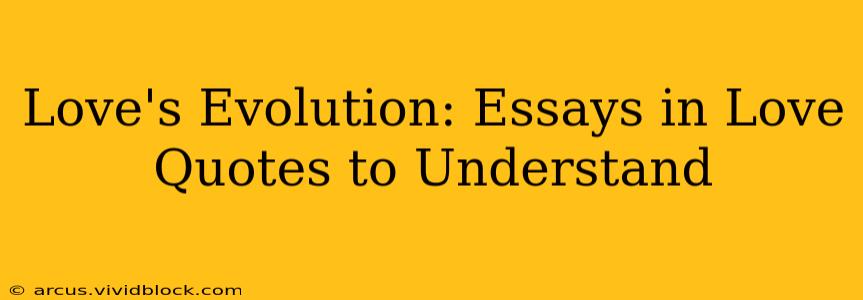Love. A word that evokes a thousand feelings, a million memories, and countless interpretations. From the passionate fire of new romance to the quiet comfort of lifelong companionship, love's journey is a complex and ever-evolving tapestry. This exploration delves into the wisdom woven within famous love quotes, examining how they reflect the multifaceted nature of love's progression, its challenges, and its enduring power. We'll analyze the nuances of different stages, offering insights into understanding the complexities of this fundamental human experience.
What are the different stages of love?
Love doesn't unfold in a linear fashion; it's a dynamic process influenced by individual personalities, relationship dynamics, and shared experiences. However, several recurring stages are often identified:
-
Infatuation: This initial phase is characterized by intense passion, excitement, and idealization of the partner. It's driven by powerful chemicals in the brain, creating a euphoric feeling that often overshadows realistic perception. Think of the whirlwind romance portrayed in classic literature – a state of intense longing and desire.
-
Attachment: As the initial intensity subsides, a deeper sense of connection and attachment develops. This stage involves increasing trust, intimacy, and a growing sense of security in the relationship. It's about shared experiences and building a solid foundation of mutual understanding.
-
Commitment: This marks a significant transition, moving beyond fleeting feelings to a conscious decision to build a lasting relationship. Commitment involves navigating challenges, making sacrifices, and actively working to nurture the bond.
-
Companionate Love: This stage, often reached after years together, signifies a deep and enduring love characterized by affection, respect, and a shared history. It's about comfortable companionship, mutual support, and a profound appreciation for one another.
What are the different types of love?
Beyond the stages, the types of love add another layer of complexity. Ancient Greek philosophers identified several distinct types, and modern psychology expands on this:
-
Eros (Romantic Love): Passionate, intense, and often characterized by physical attraction and a strong emotional connection. This is the "love at first sight" kind of love.
-
Philia (Friendship Love): Based on deep affection, shared interests, and mutual respect. It's the love you feel for close friends and family.
-
Storge (Familial Love): A natural, comfortable love that develops gradually, often within families. It's rooted in shared history and a sense of belonging.
-
Agape (Selfless Love): Unconditional love characterized by compassion, generosity, and a desire for the well-being of another. This is often associated with spiritual love or parental love.
-
Ludus (Playful Love): A less committed form of love, focused on the excitement of the chase and the pleasure of flirtation.
How can I tell if my love is real?
This is a deeply personal question, but several indicators suggest a genuine and lasting love:
-
Mutual Respect: Do you value and admire each other's strengths and accept each other's flaws?
-
Trust and Honesty: Is there a foundation of open communication and trust?
-
Shared Values and Goals: Do you share similar life visions and aspirations?
-
Emotional Intimacy: Can you share your deepest thoughts and feelings without fear of judgment?
-
Resilience in the Face of Challenges: Are you able to navigate disagreements and difficult times together?
How do I know when it's time to move on from a relationship?
Recognizing when a relationship has run its course is never easy. However, persistent unhappiness, lack of communication, repeated betrayals, or a feeling of being consistently unfulfilled are significant red flags. Prioritizing your own well-being and seeking support from trusted friends or a therapist are vital steps during this challenging time.
What is the meaning of "love is a battlefield"?
Pat Benatar's famous song "Love is a Battlefield" captures the challenges and conflicts inherent in romantic relationships. Love requires effort, compromise, and a willingness to navigate disagreements and differing perspectives. It's a metaphor for the struggles and triumphs that inevitably arise in any deeply committed relationship.
What does it mean to love unconditionally?
Unconditional love involves accepting and loving someone regardless of their flaws or imperfections. It's a deep and unwavering commitment that transcends situational factors. While it's a powerful ideal, it doesn't mean neglecting personal boundaries or tolerating abusive behavior.
This exploration of love's evolution through the lens of famous quotes provides a starting point for understanding this complex and enduring human emotion. It's a journey of self-discovery, relationship building, and navigating the ever-changing landscapes of the heart. The key is to embrace the journey, appreciate its complexities, and learn from every experience.

